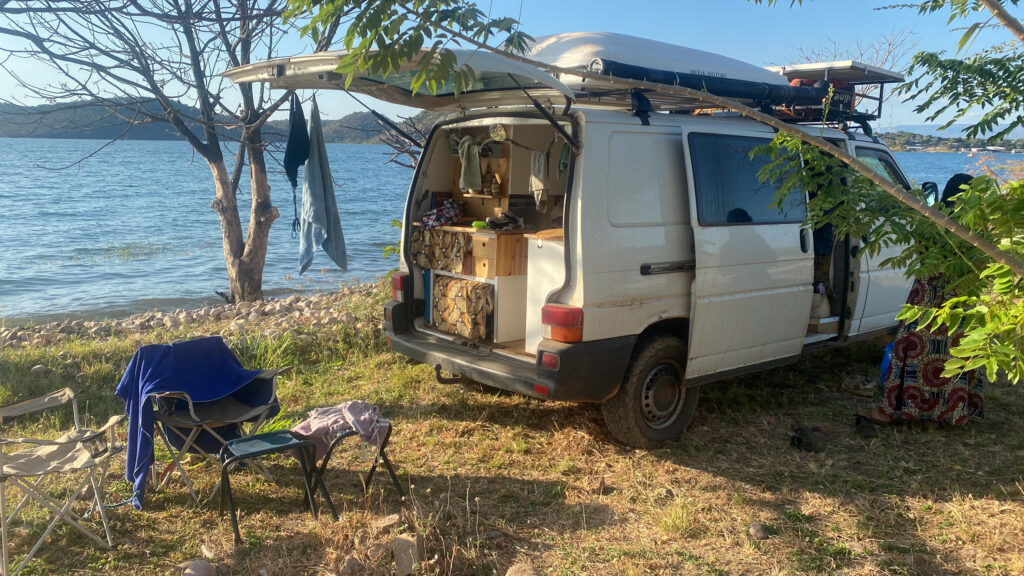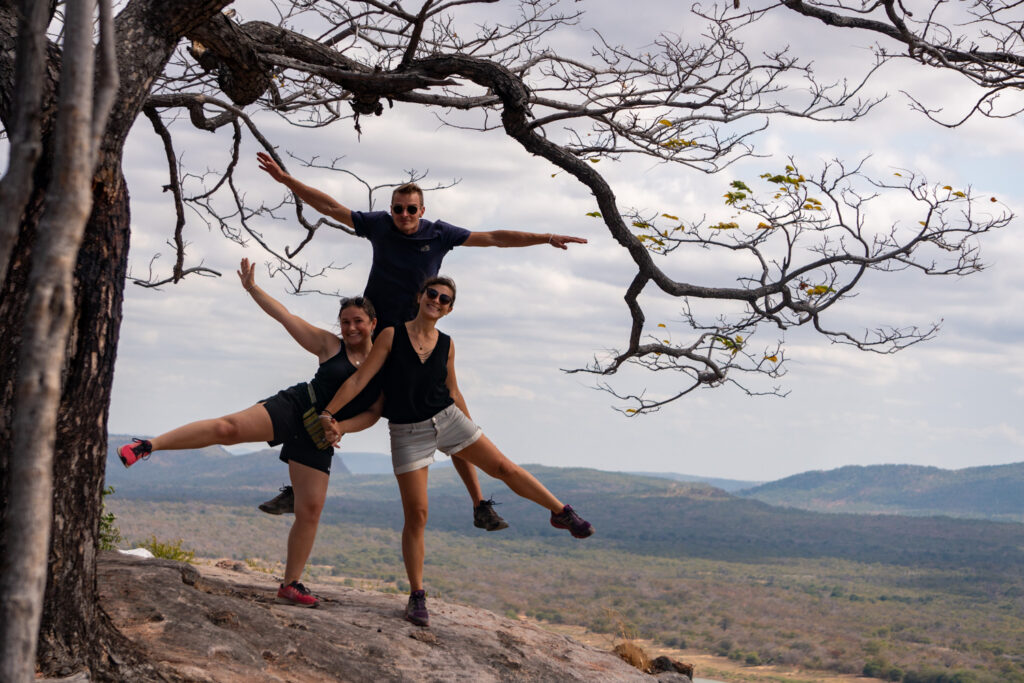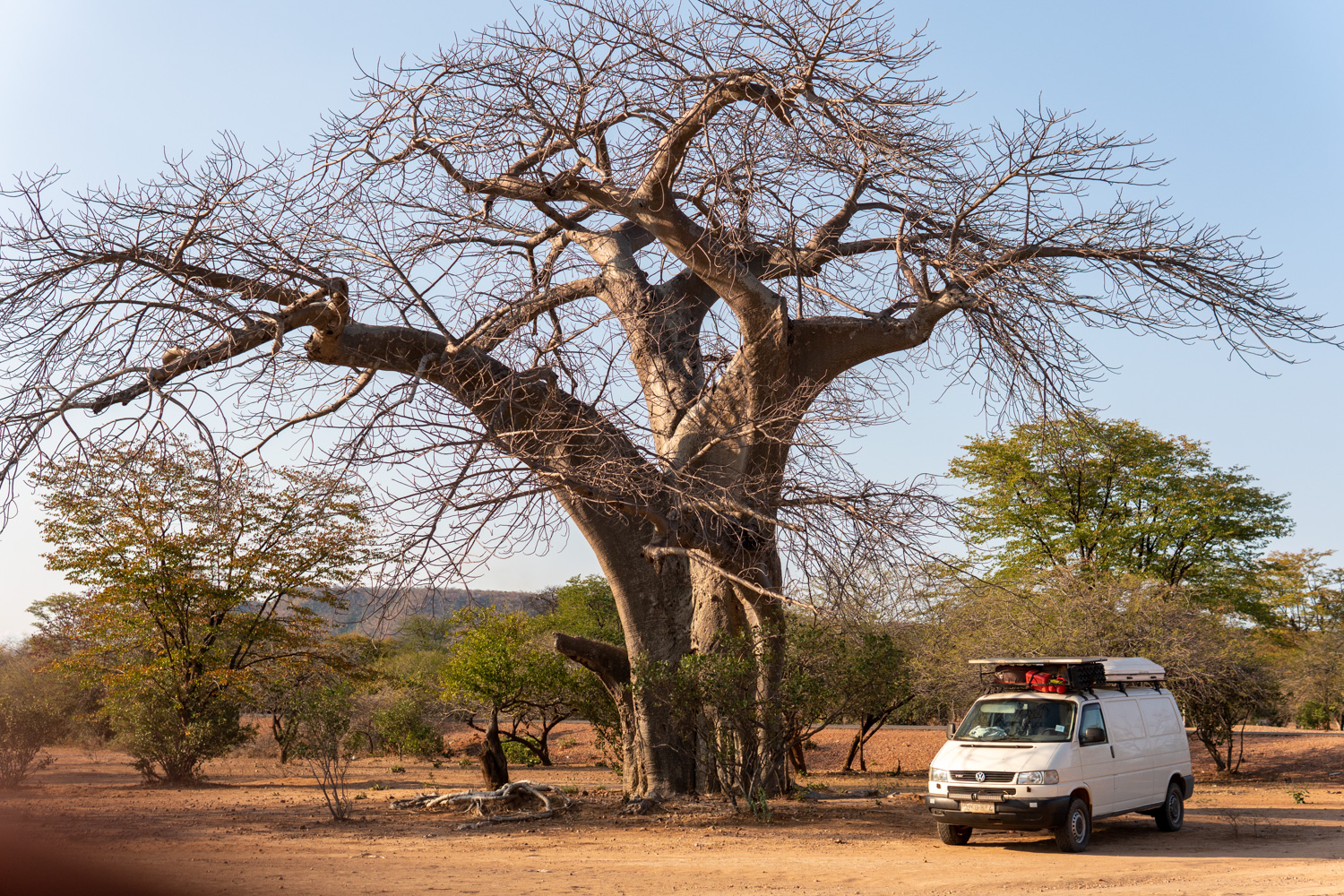“From 28th of June to 21st of July”
Lake Tanganyika
We set up our camp, our feet in the water of the huge Lake Tanganyika. It is the longest freshwater lake in the world and the second deepest after Lake Baikal in Russia. It contains 15% of the world’s fresh water. It serves as a natural border between the Congo (DRC) to the west, Tanzania to the east, Burundi to the north and our current Zambian coordinates in the south.


The crossing of Tanzania was a little bit tough (Episode 22 | More than 1000km of tracks to cross Tanzania). We want to rest for a few days. A small routine is established during these 4 days. After breakfast, the day is punctuated by a sport session, a swim, cooking and housework. It ends with a cold beer in front of the sunset at the bottom of the lake. It is the hour when the fishermen leave on their small boats. Illuminated by a small light, often just the flash of their cell phone, they set off into the black immensity. They will stay there the night and will return only at the first light of the day to sell their catch.



One morning, we went running along the lake. On the road, although it was still early, we crossed many people. They all greeted us with a big smile. We can only smile too, facing such a positive energy and thus start the day in a good mood.



We also meet a lot of locals while walking to the market. We are welcomed in the same way. The children, all excited to see us, follow us on a small path through the village. We are happy to see that in this region, people do not jump on us to ask for money.
Kapisha hot springs
We begin our crossing of the country slowly. If we make a slight detour towards the east, we can go to hot springs. To reach them, we have about forty kilometers of track. The road is not very good with many stones and is often corrugated. The famous African massage as they call it here. We take the road at our own pace, deflating our tires. No question of blowing a new shock absorber (see article #17 Amboseli, a safari at the foot of Kilimanjaro). About 10 kilometers before our destination, a noise of slamming at the back surprises us. It is strong and regular. Each time we use the shock absorbers, we hear it, but none of them seems broken. The noise sounds like a shock of metal against metal. We take the road slowly at 15 km/h trying to limit the shocks. Once we arrived, we asked to see the mechanic, Georges. While putting Uyo on the pit, we quickly discover that the lower screw that maintained the shock absorber to the suspension arm is broken. We have the old one that we can replace with our tools. We just need a screw and a bush that Georges graciously offers us.



It’s 2pm and Uyo is back to normal. We can finally relax and enjoy the hot springs. The water is translucent. At 40°C, it is not difficult to slide in. The vegetation around is luxuriant and gives us the feeling to be lost in the forest. It is a magical place to relax.


Tonight, we plan to have a nice meal with a good bottle of South African wine. When you live together every day, 24 hours a day, you need those little moments that are out of the ordinary. A romantic meal is a good way to escape from the routine. And we even dress up for the occasion.


The next day, we enjoy one last time the fresh swimming pool and the hot springs before leaving in the middle of the afternoon. We don’t intend to go far. We will surely find a wild camping close to the road. In less than an hour, we find a small road that takes us away from the main road.
At nightfall, while we are installed in Uyo watching a movie, a car parks at our level. We hear about ten men getting out and surrounding the van. Overwhelmed by this number, we do not know what to do. They start to knock at all the doors and order us to open. Valentin, already in his underwear, gets dressed to go out and explain what we are doing here. Immediately, the tone calms down. They understand that we are not poachers. Although we have not seen any of the wild animals that inhabit this forest, we are in a protected area. We end up following them to the Shiwa House, a place kept by one of them. We can now sleep in peace and so can they.


Mpika and the waterfall of new friendships
We spotted on our iOverlander app, a small waterfall a couple of kilometers down the road to Lusaka, the capital. It is not as impressive as the most touristic waterfalls in Zambia, but it has the advantage of not having a special international price. Here we are considered locals and pay as such. It is a perfect stop for our lunch.





Once installed in front of the waterfall, we prepare some leftovers for the meal. Little by little, the parking lot, still empty at our arrival, fills up. Some people just pass by to have a look and leave. Others settle down, even taking out the barbecue to grill sausages. This is what Kondwani does and invites us to join him and his friends. A beer in the hand, we spend the afternoon to exchange with them.



The next day, Kondwani invites us to come to his house, before leaving for Lusaka. He lives with a friend in a big house. In this city, the rents are half as expensive as in Lusaka. Each one pays 1000 Kwacha per month, that is to say approximately 60€. We meet them at 11am, with a glass of whisky in hand. According to them, on weekends, there is nothing else to do but drink. Going to the bar is one of the main weekend activities in the African countries we visited. On Sundays, the earlier they start, the better, to avoid a hangover on Monday morning. We are not convinced and ask for some water rather than alcohol. By discussing with the roommate of Kondwani, we learn that he made his proposal yesterday to his girlfriend and took her to the restaurant. Now they have to decide on the price of the dowry to be paid to her parents.



From Lusaka to Kafue
We don’t stay long because our new friends told us that the road to Lusaka is very bad. Especially the first section, which is full of holes. They also tell us to be careful with thieves who take advantage of the slowing down of the cars on this section. We are looking for a place to sleep once the difficult section is over. Tomorrow we should have a nice paved road to the capital.



At the end of a small path, behind the trees, we find a clear space. A small plain made of rocks, gravel and high grass. An American who travels alone with a 4×4 is already installed on the edge of the plain. We exchange quickly before settling on the other side. Tomorrow, he ends his 3 months trip in Southern Africa. He has to return his rental car. He also tells us his biggest problem in Mozambique. His car lost its footing at the end of a bridge where the road stopped. He had to walk 50 kilometers over two days to find help. Poorly equipped, without sleeping bag or tent, the night was hard. He was eaten by mosquitoes, huddled in the bushes.
Lusaka is a big economic metropolis, 2.5 million people live there. As we approache the city, we areimpressed by the number of companies that manufacture cinder blocks. We pass at least a hundred of them. It is hard to understand how they all manage to get by with so much competition.



Our mission of the day is to refuel and leave quickly. We have an appointment in Kafue, a city one hour away. For several days, we have been in contact with the innovation center of Kafue. It is a local association that fights against poverty through innovation. We are eager to discover their inventions developed with the means at hand. A video on the subject will be released next week. We have already shared on Instagram and Facebook short videos presenting some of these innovations. We spend the week at the center, on the banks of the Kafue river, until the arrival of Agathe, Laurène’s sister.




Agathe’s arrival
Back in Lusaka, we go to a campground that is a bit expensive, but close to the airport. Unfortunately, once there, the gate is closed and none of the phone numbers work. We decide to change our plan but to call first this time. It’s a lodge that should be able to welcome us on their parking. The owner is very nice. He is currently in Geneva but wants to help us. His lodge is open and after a quick phone call to the manager, he graciously offers us hospitality on his land for the night with access to hot shower and toilet. The luxury! We do not delay to go to bed because tomorrow, we have appointment at the airport, to go to look for Agathe.

I am super excited to see my sister again. After 9 months on the road, the distance with our loved ones is felt. I really want to show her our way of life and the wonders of Africa.
Kariba lake, Lotri Bay
Now with three of us in Uyo, we leave the beautiful tarred roads in the direction of Lake Kariba in the southeast of the country. The large plains give way to rocky hills. The vegetation is much more wooded. It is the first time we see so many baobabs on the roadside. The villages are often built around the oldest ones. According to certain cultures, they would bring a protection to the inhabitants of the village. With the years, they reach a massive size. A baobab tree can survive for thousands of years if it is not endangered by man.




We chose to stay a few days in Lotri bay. We heard a lot of good things about the camping part of this lodge. As soon as we arrived, we were not disappointed. We park Uyo in the shade with a nice view on the lake. For once, we are perfectly flat. Bruce, the manager, has just poured car-sized slabs to give his guests the best possible nights. Going to the campground with Bruce and Maurine, his wife, is a bit like visiting your grandparents. They are very attentive. They have thought of every detail to make the stay as pleasant as possible.
The employees of the campsite are also very helpful. Every evening, they offer us to light a fire. We bought marshmallows for the first time, to celebrate Agathe’s visit. So well installed, we intend to spend several days here at the edge of the lake Kariba. It is one of the biggest artificial lakes in the world. It was formed in the 1950s after the construction of a 118 meter hydroelectric dam in the Zambezi Gorge. At the time such an infrastructure was a technological feat.




From our camp, a large panel of activities are offered to us. We start with a hike to stretch our legs. A 7 kilometer loop crosses the hill of the estuary where we are located. From the top, a 360 degree panoramic view allows us to realize the immensity of the lake. In the distance, we can distinguish the coasts of Zimbabwe. The next day, by canoe, we explore a small part of the lake. In the evening, the sunsets are grandiose. It is often at this time that the zebras come to join us on the camp to graze the grass.









